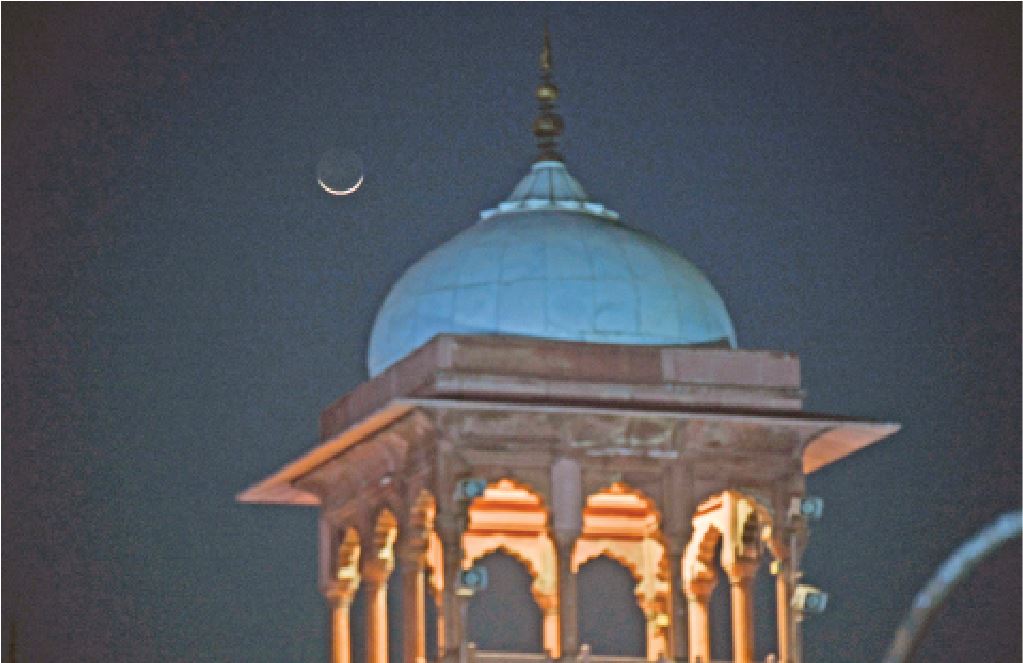


Even as Muslims across the world celebrated Eid ul Fitr festival with gaiety and festivities, the sighting of the moon was a contentious issue with Eid getting celebrated on different dates. Eid ul Fitr, which comes after a month-long season of Ramadan fasting, was celebrated on one day in Kerala and Kashmir and on another day in the rest of the country.
A question that goes unanswered is whether in this time and age of science and technology, shouldn’t a single date on which Muslims should celebrate Eid ul fitr and Eid ul Azha in a big country like India? It will show a united face of Muslims in the country and help the government and organizations to declare a holiday on the same day. Different Muslim religious groups, organisations and institutions such as Muslim Personal Law Board should take initiative in this direction. Keeping in mind some religious rules, the moon’s visible day can be determined on the basis of astronomical calculations.
In 21st century, a thought needs to be given whether Muslims would be better off working out a national consensus, cutting across sects and sub-sects to celebrate Eid on a particular day in a large country like India? Apart from presenting a united faced of Muslim ummah, national consensus on Eid would help seemingly minor but significant matters such as bank, school and labour holidays.
Various Muslim religious groups, NGOs and bodies like All India Muslim Personal law Board need to take initiative to settle the issue in amicable manner on priority basis in keeping with religious norms and spirit using proven scientific methods and mathematically computed astronomical calculations.
The arguments against having a single day Eid focus on the requirement of physical Moon sighting (with the naked eye) to confirm the beginning and ending of the Islamic months such as Ramzan and Shawwal. However, many religious scholars argue that the holy Quran did not require physical Moon sighting as the legal cause (sabab) for fasting or celebration of Eid. It is an agreed upon fact among all that the Qur’anic phrase “whoever witnessed the month” means whoever is present in his residential place and gets to know about Ramadan’s arrival through any kind of knowledge, including sighting but not confined to sighting, should fast. The Prophetic reports apparently asking for sightings to begin or end Ramadan, in reality, require “certainty of knowledge” vis-à-vis arrival and end of the month of Ramadan.
In present day world, Muslims followers of Hanafi, Maliki, Hanbali and Shafa’ee school of thought, living in USA, Canada, Australia, UK, Europe, Middle-East and in other far away places, habitually accept moon sighting in Saudi Arabia as starting and ending of Ramzan and rest of the Islamic calendar. But in South Asia, Muslim bodies insist about diversity of horizons in regards to confirming the sighting of the moon. Given the rigidity and conservative nature of Muslim clergy in India, asking the entire Muslim community to celebrate Eid if the new Moon is sighted anywhere in the country is not easy. But this year, during Ramzan, this unlikely scenario had become a reality when most Muslims accepted fasting by seeing the new Moon not through the naked eye but elsewhere in the country.
The argument here is not to bypass the concept of physical sighting altogether but to allow use of astronomy and mathematical calculations in cases of obscurities such as clouds.
The point of the matter is that while not negating the tradition of seeing the moon in the new month, there should also be arrangements made — on the basis of mathematical calculations and astronomy — to decide on sighting of the moon.
Traditionally, Eid-ul-Fitr day for Muslims begins early with bath, new clothes and post special prayers, Muslims are encouraged to hug one another, twice and then eat something sweet, sewaiyan, sheer, kheer, dates etc. Young children are given ‘Eidy’ ( token Eid money) usually in crisp, new currency notes by their elders, relatives and well-wishers.
In popular culture, Eid and Eidgah are frequently mentioned. A couple of years ago, Prime Minister Narendra Modi had narrated Munshi Premchand’s iconic short-story ‘Eidgah.’ Modi had admitted that the story’s central character ‘Hamid’ had inspired him with his heart-warming act of empathy. The story is about young Hamid, who does not buy sweets or gifts during Id but buys a ‘Chimta’ so that his grandmother does not burn her hands while cooking. This story is extremely emotional, PM Modi had remarked.